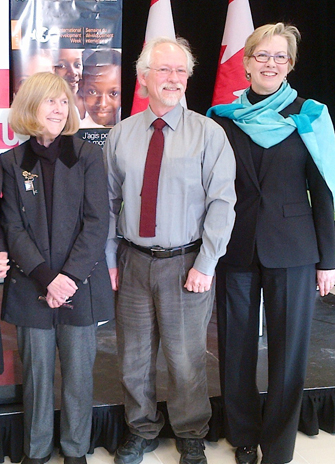The Canadian International Development Agency (CIDA) awarded York University almost $6.2 million to lead two major research projects, Member of Parliament Lois Brown announced Monday at York.
The projects will bring post-secondary education to the Dadaab refugee camps and surrounding area in northeastern Kenya, and promote employment of people with disabilities in Bangladesh, India and Nepal. The first project will be led by anthropology Professor Wenona Giles and education Professor Don Dippo, the second by Professor Marcia Rioux of the School Health Policy & Management in the Faculty of Health.

From left, York’s Vice-President Research & Innovation Robert Haché, MP Lois Brown, Professor Marcia Rioux, Professor Don Dippo and Professor Wenona Giles
“York University is proud of our research leaders in this area,” said York President & Vice-Chancellor Mamdouh Shoukri. “This funding allows our researchers to grow and strengthen their innovative research programs and international collaborations aimed at developing solutions to complex challenges in regions of the Global South.”
Giles of the Faculty of Liberal Arts & Professional Studies and Dippo of the Faculty of Education, both associated with the Centre for Refugee Studies at York University, will lead Borderless Higher Education for Refugees (BHER), an international project that engages multiple Canadian and Kenya-based institutions. It will receive more than $4.5 million in CIDA funding over five years and could serve as a model in other marginalized communities throughout the world that seek to achieve access to higher education.
The goal is to improve equity in higher education, prepare local uncertified refugee teachers, improve teaching practices for better student achievement at elementary and secondary levels, and  provide a number of university degree programs in and around the Dadaab refugee camps in Kenya.
provide a number of university degree programs in and around the Dadaab refugee camps in Kenya.
Lois Brown
By simultaneously engaging teachers as students in online/on-site university degree programs, the BHER project will build portable teaching capacity, indirectly impacting the learning opportunities of more than 18,000 pupils in elementary and secondary education and up to 1,000 students in higher education. Project partners are York University, the University of British Columbia and World University Service of Canada (who all contributed to matching the funds provided by CIDA), the African Virtual University, Kenyatta University, Moi University and Windle Trust (Kenya).
“Researchers at York are taking an active leadership role in working together with partners ranging from community groups, educational institutions and international organizations around the world to inform public policy, create new knowledge and  provide insights into complex social and economic challenges facing the international community,” said Robert Haché, York’s vice-president research & innovation.
provide insights into complex social and economic challenges facing the international community,” said Robert Haché, York’s vice-president research & innovation.
Wenona Giles
Brown, parliamentary secretary to Minister of International Cooperation Julian Fantino, told the gathering that, “Through these partnerships with York University, Canadians can take pride in knowing that teachers in Kenya will receive better training to help elementary and secondary school students in refugee camps.”
Rioux, director of the York Institute for Health Research, will lead a major international project on the key labour market causes of chronic unemployment and poverty of persons with disabilities. The project will receive more than $1.6 million in CIDA funding over five years and more than $1.3 million in matching funding from Canadian partnership organizations.
It will focus on primarily urban areas, including Bangladesh (Dhaka), India (Hyderabad) and Nepal (Katmandu), and will impact the decision-making of small- and medium-sized enterprises in the hiring and promotion of people with disabilities. It will also  provide labour market skills to persons with disabilities to maximize their capacity to make an economic contribution. Using gender-sensitive labour market inclusion strategies, local capacity will be built to engage in sustainable actions that will increase the economic well-being of persons with disabilities.
provide labour market skills to persons with disabilities to maximize their capacity to make an economic contribution. Using gender-sensitive labour market inclusion strategies, local capacity will be built to engage in sustainable actions that will increase the economic well-being of persons with disabilities.
Marcia Rioux
Overseas partner organizations on the project include: Subhi Association for Women with Disabilities, Council for Social Development, Disabled Peoples International Asia-Pacific, Bangladesh Protibandhi Kallyan Somity, Swadhikhaar Centre for Disabilities Information, Research and Resource Development, National Federation of the Disabled-Nepal, as well as employer associations and individual employers. Grounded in the UN Convention on the Rights of Persons with Disabilities, a treaty to which Canada is a signatory, this project expands an ongoing project, Disability Rights Promotion International, housed at York University.
“Students at York University will also have the opportunity to participate in an initiative that will increase the employability and livelihoods of persons with disabilities in Bangladesh, India and Nepal,” said Brown. “CIDA is working with Canadian universities to deliver tangible results for those most in need around the world. By tapping into the expertise of York University, Canada will help provide vulnerable children, women and men with the essentials for sustainable livelihoods over the long term.”
For more information on both projects, click here.


